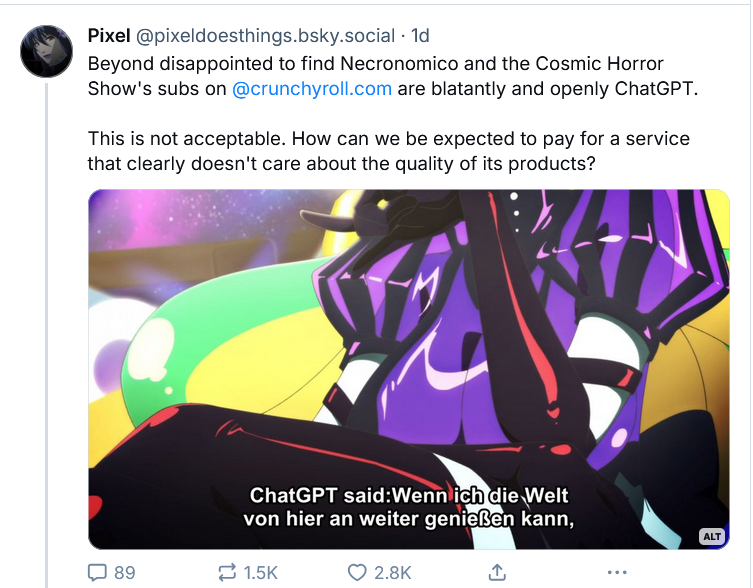- Crunchyroll aired anime with obviously AI-generated subtitles that included typos, clunky phrasing, and lines like “ChatGPT said.”
- Fans quickly noticed and criticized the lack of human oversight
- The incident highlights growing concerns about AI replacing creative roles without proper review, particularly in localization, where context and tone are crucial
There are mistranslations, and then there are ChatGPT subtitles that appear to have been deliberately written to upset people. That’s what appeared to happen with some of the translated Japanese shown on screen during episodes of anime recently spotted and shared online.
The first example to gain attention online made it clear that ChatGPT was the culprit of awkward and outright wrong translations during an episode of Necronomico and the Cosmic Horror ShowCrunchyroll’s new anime series about occult weirdness and internet brain rot. It literally included the line “ChatGPT said” in both the German and English subtitles.
Fans started posting screenshots of bizarre sentence structures and dialogue that they had spotted, and now had an explanation and a source of blame for. Misspelled character names, inconsistent phrasing, and just outright made-up words and phrases were spotted everywhere.

I only watched about two minutes, and was so frustrated at the subs having errors that even a normal machine translation wouldn’t have given.
— @hilene.bsky.social (@hilene.bsky.social.bsky.social) 2025-07-03T02:47:11.136Z
In case that wasn’t enough, Crunchyroll’s president, Rahul Purini, had told Forbes in an interview only a few months ago that the company had no plans to use AI in the “creative process.” They weren’t going to mess with voice acting or story generation, he said. AI would be restricted to helping people find shows to watch and to recommending new shows based on what viewers had previously enjoyed.
Apparently, ChatGPT translations don’t count under that rubric, but localization isn’t a mechanical process, as any human translator could explain.
Localization art
Hey now, show some respect for the most storied of all anime subbers: Translator’s name
— @viridianjcm.bsky.social (@viridianjcm.bsky.social.bsky.social) 2025-07-03T02:47:11.132Z
Localizing is a big deal among anime fans. Debates over whether certain subtitles are too literal, too loose, or too limited in their references to be understood outside Japan have raged for decades. But no one on any side of those debates is likely to claim these massive errors by ChatGPT are okay.
Crunchyroll hasn’t officially clarified how this happened, but reports suggest the subtitles came from the company’s Japanese production partner. The generated subtitles may have been given to Crunchyroll to air without Crunchyroll being responsible for making them.
As several people pointed out, when you pay to stream anime from a major platform like Crunchyroll, you’re expecting a certain baseline of quality. Even if you disagree with a localizer’s choices, you can at least understand where they are coming from. The fact that apparently no one read the ChatGPT subtitles before they were uploaded to a global audience is harder to justify.
Translation is an art. Localization isn’t just about replacing Japanese with English. It’s about tone, cadence, subtext, and making a character sound like themselves across a language barrier. AI can guess what words go where, but it doesn’t know the characters or the show. It’s like a little translation dictionary, which is fine as far as it goes, but it can’t make a conversation make sense without a human piecing together the words. A few fans are outraged enough to call for unsubscribing and going back to sharing fansubs, the homebrewed subtitles unofficially written and circulated back in the days of VHS. In other words, the very thing Crunchyroll once helped make obsolete by offering higher-quality, licensed versions of shows.
At a time when more people are watching anime than ever before, Crunchyroll is apparently willing to gamble that most of us won’t notice or care whether the words characters say make any sense. If Crunchyroll wants to keep its credibility, it has to treat localization not as a tech problem to optimize, but as a storytelling component that requires human nuance and judgment. Otherwise, it might just be “gameorver” for Crunchyroll’s reputation.


